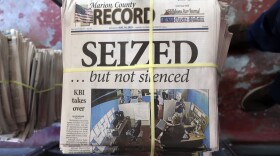Police Chief Gideon Cody arrived at the Marion County Record and handed a copy of a search warrant to Deb Gruver, the veteran reporter who had questioned him about alleged misconduct at his previous job.
As Gruver read the search warrant, she told Cody she needed to call her publisher and editor, Eric Meyer. The police chief, who was ostensibly investigating another reporter’s computer use, snatched the phone out of Gruver’s hand.
The scene is recounted in a lawsuit Gruver filed Wednesday in federal court that says Cody had no legal basis for taking her personal cellphone. She is seeking damages for “emotional distress, mental anguish and physical injury” as a result of Cody’s “malicious and recklessly indifferent violation” of her First Amendment free press rights and Fourth Amendment rights against unlawful search and seizure.
Cody spearheaded the Aug. 11 raid under the pretense that reporter Phyllis Zorn committed identity theft when she accessed public records on a public website. His real motivation, Gruver’s lawsuit contends, was to punish the journalists for investigating and reporting news stories.
Gruver had questioned Cody in April, when he was hired as police chief, about allegations made by his former colleagues with the Kansas City, Missouri, Police Department. They accused Cody of making sexist comments, being a poor leader and driving over a dead body at a crime scene.
The newspaper initially declined to write about the allegations without an on-the-record source or documentation that Cody was in danger of being demoted when he left Kansas City.

In Marion, a town of about 1,900, Cody became an ally of Kari Newell, who owns a restaurant and cafe.
A dizzying drama unfolded in the days preceding the Aug. 11 raid as Newell had Cody evict Meyer and Zorn from a public meeting at her cafe, and a confidential source provided Zorn with information that could jeopardize Newell’s efforts to obtain a liquor license at her restaurant.
The source said Newell had lost her driver’s license following a 2008 drunken driving conviction. When Zorn asked the Kansas Department of Revenue how to verify the information, the agency directed her to search the public records in its online database. Meyer told Cody about the information in part because the source also alleged that police knew Newell was driving without a license and had ignored repeated violations by Newell of driving laws.
Cody prepared an affidavit that claimed Newell was the victim of identity theft, and he requested permission to raid the newspaper office. Cody wrote in his affidavit that Zorn had accessed Newell’s driver’s license history by impersonating Newell or lying. Magistrate Laura Viar authorized the raid.
Nothing in the affidavit or search warrant connects Gruver or her cellphone to the alleged crime. The search warrant only identifies Zorn as a suspect.
Cody ignored federal and state laws that prohibit authorities from taking journalists’ materials as he and his four police officers, aided by two sheriff’s deputies, seized an assortment of electronic devices from the newsroom that were unrelated to Zorn’s supposed crime.
Officers read the reporters their Miranda warning during the raid, then left them waiting outside for three hours in heat that reached 100 degrees. After the raid, Gruver went to the sheriff’s office, where police stored the confiscated equipment, to ask for her personal cellphone.
Gruver spoke with Cody there and told him she had nothing to do with the search of driver’s license records.
Cody grinned.
“I actually believe you,” he said, according to the court filing.

The equipment was returned five days later, when the county attorney determined there wasn’t evidence to support the search warrants. Police altered an evidence list to avoid disclosing they secretly copied and unlawfully retained files from the computers.
Gruver is seeking at least $75,000, the minimum threshold for filing a civil case in federal court. She is suing Cody in his individual capacity for the “shocking, unprecedented and unconstitutional police raid,” her lawsuit says. Cody could claim qualified immunity, but the lawsuit argues that no reasonable police officer would think his actions were constitutional.
Blake Shuart, a Wichita attorney, is representing Gruver.
Newell is not a defendant in the lawsuit, but her name appears 25 times through 18 pages of the complaint.
The lawsuit notes that Gruver and Newell had been friendly before Cody’s arrival. When Gruver was new to town in August 2022, the lawsuit says, she wrote a “glowing review” of Newell’s restaurant. The review complemented Newell’s spatchcock chicken with whole new potatoes and asparagus, followed by “death by chocolate” cake.
Then, in April 2023, Newell objected to Gruver talking to sources on the phone while at her restaurant and began complaining about her reporting, the lawsuit says. In a contentious exchange of text messages, according to the lawsuit, Newell told Gruver she was not one to mess with.
News of police raiding a newsroom attracted international scrutiny. The Marion County Record continued to publish its weekly paper and report on the circumstances surrounding the raid.
Recent Record stories revealed additional allegations made against Cody by his former colleagues. A former internal affairs detective for the Kansas City, Missouri, Police Department said he “lost count” of Cody’s violations. The detective asked not to be named.
“He has horrible, horrible ‘little man syndrome.’ His ego is taller than he is,” the detective said.
This story was originally published on the Kansas Reflector.
Copyright 2023 KCUR 89.3. To see more, visit KCUR 89.3. 9(MDA4OTAxNzAzMDEzMjc0MTc2MzA5ZDZlMw004))







